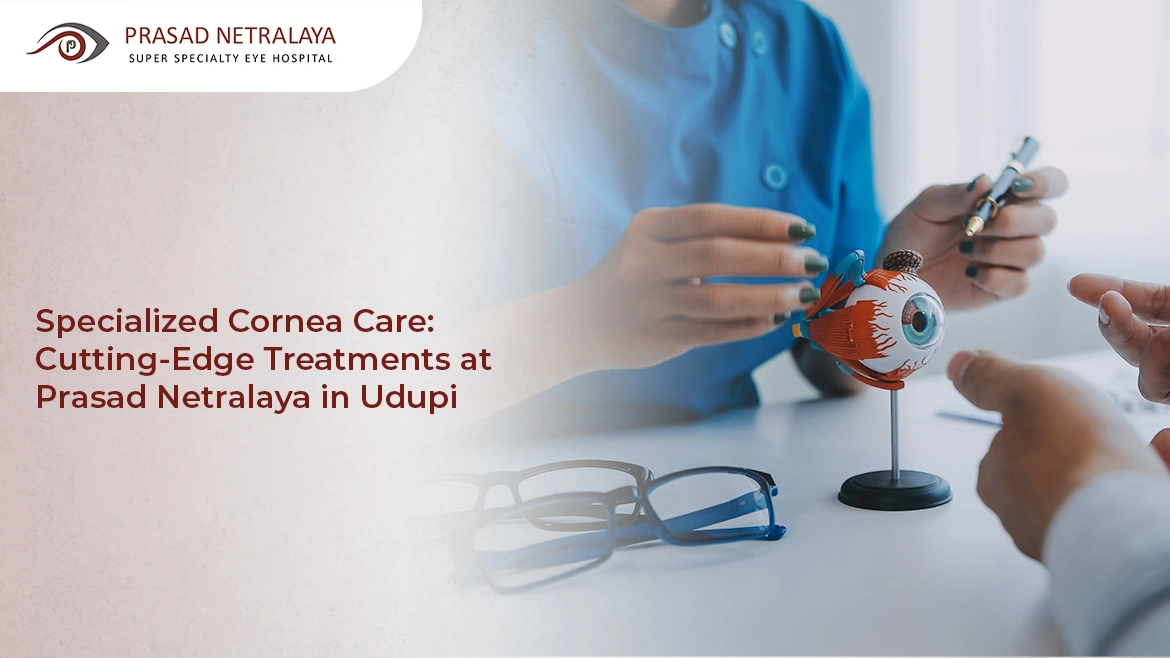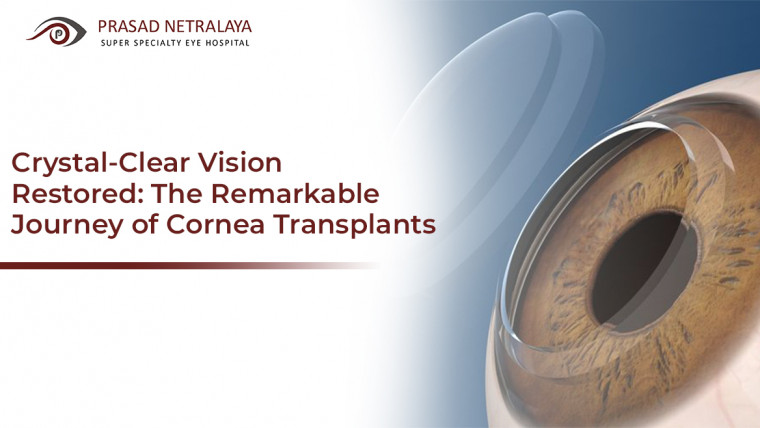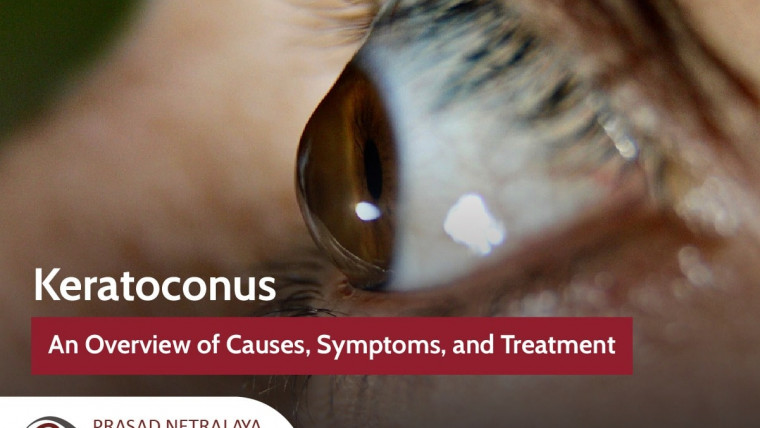When the cornea, the transparent outer layer of the eye, is damaged or affected, it can greatly impact vision and quality of life. Experiencing such issues while searching for specialized cornea care can be overwhelming. This is why we’re here to introduce you to the best in the field—Prasad Netralaya.
At Prasad Netralaya, we’re dedicated to treating corneal conditions with precision and compassion. As a top center for specialized cornea care, we offer tailored treatments for various issues, from keratoconus to corneal transplants. Our expert team uses the latest technology and a patient-focused approach to deliver results that improve not just your vision but your overall well-being.
Table of Contents
Corneal Conditions Treated at Prasad Netralaya
Here’s a detailed overview of how different corneal conditions are treated at Prasad Netralaya:
1. Keratoconus
- Corneal Cross-Linking: A minimally invasive procedure to strengthen the cornea and halt the progression of keratoconus.
- Intracorneal Rings: Implantation of small rings to reshape the cornea and improve vision.
- Corneal Transplant: In advanced cases, a corneal transplant may be necessary to replace the damaged cornea with a healthy one.
2. Fuchs’ Endothelial Dystrophy
- Corneal Transplant: Prasad Netralaya offers corneal transplant surgery to replace the damaged endothelial layer with a healthy one.
- Descemet’s Stripping Endothelial Keratoplasty (DSEK): A minimally invasive procedure to replace the damaged endothelial layer with a healthy one.
- Descemet’s Membrane Endothelial Keratoplasty (DMEK): A more advanced and selective procedure to replace only the damaged endothelial layer.
3. Corneal Ulcers
- Antibiotic Therapy: Prasad Netralaya provides antibiotic therapy to treat bacterial corneal ulcers.
- Antifungal Therapy: Antifungal medications are used to treat fungal corneal ulcers.
- Surgical Debridement: In severe cases, surgical debridement may be necessary to remove dead tissue and promote healing.
4. Corneal Scars
- Corneal Transplant: Prasad Netralaya offers corneal transplant surgery to replace the damaged cornea with a healthy one.
- Phototherapeutic Keratectomy (PTK): A laser procedure to remove scar tissue and promote healing.
- Corneal Cross-Linking: A minimally invasive procedure to strengthen the cornea and reduce scar tissue.
5. Dry Eye Syndrome
- Artificial Tears: Prasad Netralaya recommends artificial tears to lubricate the eyes and reduce dryness.
- Punctal Plugs: Small plugs are inserted into the tear ducts to block excess tear drainage.
- Meibomian Gland Expression: A procedure to express the meibomian glands and improve tear quality.
Related blog: Effective remedies for dry eyes.
📝Note: The treatment options may vary depending on the individual case and the severity of the condition.
Understanding Corneal Transplantation Services
Here’s a brief overview of the corneal transplants offered at Prasad Netralaya, the reason we stand out as the specialized cornea care centre:
Types of Corneal Transplantation
1. Penetrating Keratoplasty (PK): A traditional corneal transplant procedure where the entire damaged cornea is replaced with a healthy donor cornea.
2. Deep Anterior Lamellar Keratoplasty (DALK): A partial-thickness corneal transplant procedure where only the damaged anterior layers of the cornea are replaced with healthy donor tissue.
3. DMEK / DSEK : Highly selective and advanced corneal transplant procedures where only the damaged endothelial layer of the cornea is replaced with healthy donor tissue.
Benefits of Advanced Corneal Transplantation Services
Here are some benefits of advanced corneal transplant techniques:
1. Faster Recovery Times: Advanced techniques like DALK and DMEK reduce recovery time, allowing patients to regain their vision and resume daily activities sooner.
2. Reduced Risk of Complications: Minimally invasive procedures decrease the risk of complications, such as infection, rejection, and astigmatism.
3. Improved Visual Outcomes: Advanced techniques provide better visual outcomes, with improved clarity, sharpness, and reduced risk of astigmatism.
4. Minimally Invasive Procedures: Techniques like DMEK involve smaller incisions, reducing trauma to the eye and promoting faster healing.
Also, read about 5 best eye hospitals in Mangalore for cornea treatment.
See the Difference with Specialized Cornea Care at Prasad Netralaya!
At Prasad Netralaya, we believe that every corneal condition, big or small, deserves expert care and attention. Whether you’re dealing with a minor issue or a more complex condition, our patient-focused approach guarantees that you’re in the best hands.
We’re committed to providing precise and compassionate care to help you see life clearly again. For specialized cornea treatment that you can trust, Prasad Netralaya is the choice for your eye health.
It’s time to stop searching for the “best eye doctor near me” and experience the best in cornea care. Contact us or visit our clinic to experience specialized cornea care you can always count on.
Frequently Asked Questions (FAQS):
1. How to take the best care of your cornea?
Some of the important tips for promoting corneal health are:
1. Green vegetables in your diet
2. Include Perform eye exercises
3. Include fruits in your diet
4. Quit smoking
5. Protect your eyes from excessive sun exposure2. What is a cornea specialist?
A Cornea specialist is called an ophthalmologist (the one who specialises in performing cornea surgery). The cornea is a crucial part of your eye that works to focus all the light that reaches your eye.
3. Can the cornea recover itself?
Yes, the cornea can heal minor injuries and scratches on its own, but severe damage may require medical treatment to fully recover.
4. Who needs cornea surgery?
Cornea surgery is recommended for those with advanced conditions like keratoconus, Fuchs’ dystrophy, corneal ulcers, or damage from trauma or infection.
5. What are the medications for cornea?
Medications include antibiotics for bacterial infections, antifungals for fungal issues, antivirals for viral infections, and anti-inflammatory drops for swelling.
Dr. Vikram Jain, M.S. had his medical training (MBBS) from Kasturba Medical College, Mangalore, India. He did his master’s in Ophthalmic surgery from Kasturba Medical College, Manipal. He currently manages the Glaucoma department of Prasad Netralaya hospital.



